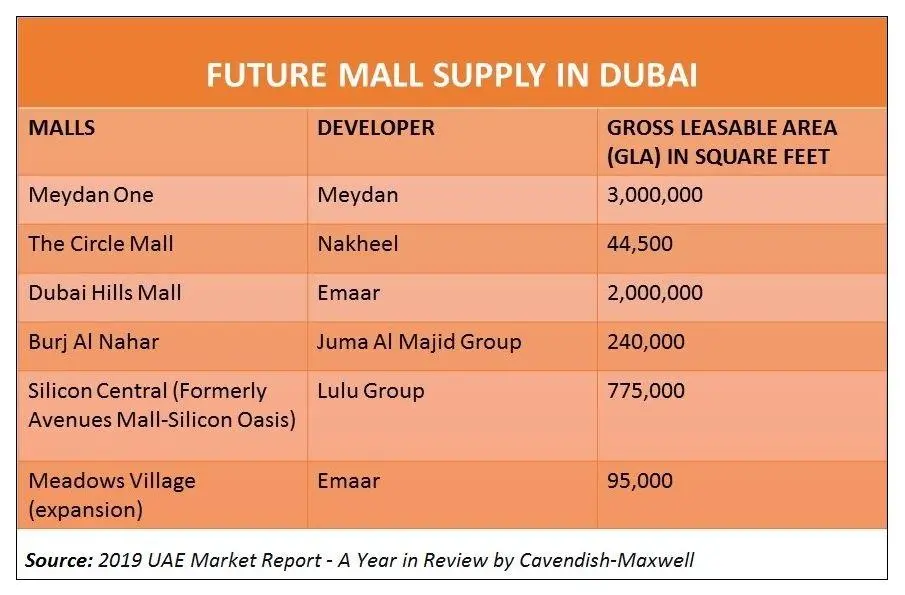PHOTO
The challenges posed by the rise in supply of retail stock and the growth of e-commerce is forcing the UAE retailers and asset owners to be flexible and innovative, according to industry experts.
Dubai's retail stock is expected to increase to 5.91 million square metres (sqm) by 2025 from 3.46 million sqm as of fourth-quarter 2019, a 56 percent increase over five years, according to Taimur Khan, Associate Partner, Knight Frank.
"Almost 83 percent of the upcoming stock by total area [in Dubai] is classed as regional or super-regional stock," Khan said in an email interview with Zawya Projects, adding that more than 90 percent of the existing retail stock is classed the same.
Super-regional malls are malls with more than one million square feet (sq ft) of the total leasable area while regional malls have less than one million sq ft.
"Looking at the pipeline of upcoming developments in Dubai, we expect further pressure to be exerted on retail assets of all grades," he said.
Aditi Gouri, Associate Partner, Strategic Consulting and Research, Cavendish Maxwell told Zawya Projects that retail establishments and malls are continuing to open at a rapid pace in Dubai as new residential communities are handed over, and existing ones expand.
"Among the recent new openings was Palm Jumeirah's 5-storey Nakheel Mall with over 1.1 million sq ft of leasable area, Festival Plaza by Al Futtaim in Jebel Ali which also houses IKEA's largest store in the UAE," she said in an email interview. "The Souq Extra extension in Dubai Silicon Oasis is spread over 77,000 sq ft and the Dubai Mall Zabeel, an extension of the largest mall in the world, is another popular project, though it is yet to see many stores open to the public."


The rise of omnichannel
Knight Frank's Khan said a higher penetration of e-commerce would impact retailers' margins, but physical retail assets with significant demand drivers will attract visitors from broader catchment areas.
"The physical retail space in the UAE, particularly [ones] focused around the destination and entertainment-focused developments, will attract both retailers and consumer demand," he explained.
Given new stock due for delivery, he pointed out that non-prime assets in secondary locations are likely to be repurposed into offices or co-working spaces.
Anthony Spary, Director-Head of Retail Agency, CBRE, said the softening market conditions in the UAE had led retailers to carry out extensive portfolio optimisation exercises to ensure their real estate remains relevant.
"What was once primary locations are now secondary, or arguably tertiary locations and where stores were once profitable, due to a change in demographic, catchment, new competing assets and overall consumer behaviour, this is forcing retailers to re-assess their entire portfolio, ensuring they have a sustainable and robust model for the future," he said in an email interview with Zawya Projects.
Citing the UK as an example of a mature market, Spary pointed out that the impact of e-commerce on bricks and mortar retail could be seen in the trend where 20 percent of the country’s overall retail sales have moved online.
"[However,] retailers are adapting quicker than ever to ensure they are providing a truly omnichannel approach to connect with the consumer. This is already feeding into the Middle East market," he said.
Cavendish Maxwell's Gouri pointed out that an omnichannel experience, where in-store and online retail blend seamlessly, as opposed to one which excludes physical retail altogether, is a more realistic future.
"Online retail still has some limitations to overcome in certain segments, for instance, in apparel or electronics, where customers might prefer to experience a product before purchase physically," she said.
Spary said the scaling back or reduction of store portfolio by traditional retailers is creating opportunities for e-tailers to secure prime bricks and mortar spaces, and for new brands to enter the region.
"It is critical for landlords to cater to this omnichannel approach to ensure a diversified mix within their assets," he said.
Innovations on the ground
Gouri pointed out that e-commerce giants like Amazon are also venturing into physical retail with the aim of transforming the physical retail experience through digitisation that addresses customer pain-points.
"An example of this is Amazon Go, Amazon's futuristic grocery store chain in the US, where customers aren't required to stand in long checkout lines and only require the mobile app to shop in-store," she said.
Sanjay Chimnani, CEO of Popuprent, a portal for companies wanting to rent retail spaces for short periods in Dubai, pointed out that by expanding into physical stores, Amazon can maintain healthy growth as online sales account for only 17.5 percent of total retail sales in the US.
"Amazon is amongst the ranks of other digital-first businesses (Facebook, Spotify, Birchbox, to name a few) to leverage physical shops as a way of extending their customer offering," he said.
He pointed out that the high entry barriers for retail in Dubai make it difficult for start-ups or international businesses to set up shop quickly and smoothly.
"The landlord's preference for long-term tenants and the costs of upkeep is keeping spaces expensive. Therefore, landlords should consider the needs of the modern (millennial) retailer, and here flexibility and value will help in ensuring retail spaces are kept leased."
Popuprent, he explained, removes the entry barriers by providing a platform where landlords and tenants can connect for short-term rental of retail space
"The short-term rental of retail space in Dubai will encourage small businesses or international businesses to consider Dubai as an attractive place to test their products. For landlords, it offers a gateway to these brands to try their spaces in the hope of turning them into a longer-term tenant," he said.
Dubai’s regional status
CBRE's recent report 'How Global is the Business of Retail' noted that by hosting 62 percent of global brands, Dubai led the region in terms of global retailer presence. The softening market in Dubai has opened the doors for the remaining 38 percent to enter the region, according to Spary,
"CBRE has spent the last 2-3 years dealing with a large number of retailers not yet operating in the Middle East, many of whom have now secured space or are negotiating on prime locations in prime assets," he said.
He said the firm is also talking to several UAE developers, who are pre-leasing future assets, giving start-ups and new homegrown concepts an opportunity to test the market.
"This helps them in minimising the risks by reducing the costs of start-up, increasing flexibility and enabling the retailer to be dynamic in a competitive market place," he said.
Spary said these developers, upon successful proof of concept, are then willing to offer the retailer a physical location on a longer-term basis, enabling them to grow within their assets.
He also pointed out that brick and mortar retail would remain relevant in the region as it still accounts for almost 95 percent of total retail sales.
"What we do see, however, is the need for greater flexibility with retailers now requesting and being offered break clauses, shorter lease terms, turnover-only commercial structures and longer grace periods," he said.
"No matter whether the retailers are new-to-market brands, millennials or start-ups, this level of flexibility is the new norm that developers will need to offer to ensure they continue to attract the right brands for their assets," Spary concluded.
(Reporting by Hina Navin; Editing by Anoop Menon)
(anoop.menon@refinitiv.com)
#UAE #RETAIL #E-COMMERCE
Disclaimer: This article is provided for informational purposes only. The content does not provide tax, legal or investment advice or opinion regarding the suitability, value or profitability of any particular security, portfolio or investment strategy. Read our full disclaimer policy here.
© ZAWYA 2020





















